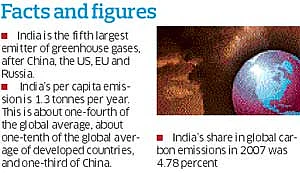
The 17th edition of the Conference of Parties to the United Nations Framework Convention on Climate Change (UNFCCC) is all set to begin in Durban on Monday to take a decision on continuing with the Kyoto Protocol that puts a cap on emission ceiling for rich countries, which in turn means curbing their industrial growth to some extent.
Since the first commitment period of Kyoto Protocol ends in 2012, a decision needs to be taken immediately so that there is no gap between the first and second commitment periods. But many rich nations, including Japan, Russia and Canada, do not favour a second commitment period.
The rich nations want a new legally-binding international treaty, which will mandated emission cuts for India and China along with the developed countries. The two emerging Asian giants are against any such treaty as it would harm their economic growth.
For their survival, the developing country block led by G77 and China is pushing for a second commitment period as red lines in the negotiation.
“The BASIC countries (Brazil, South Africa, India and China) will remain focused on Kyoto Protocol’s second commitment period,” said a Union environment ministry official, who is a part of the Indian negotiation team in Durban.
While the European Union is not averse to the second commitment period, it wants emerging economies like India and China also to cut their emission levels, which in absolute terms are very high but quite low when one takes into account per capita emission.
“Why the entire debate is only on developing countries? Why not on the failure of the developed countries to fulfill their commitments,” said the official. India has recently forwarded three additional agenda items to the UNFCCC for discussions in Durban.
